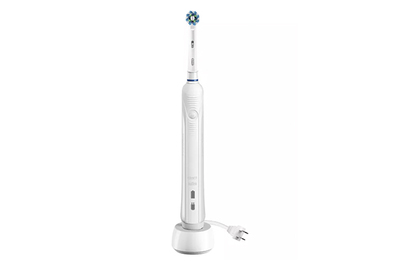For years, my twice-daily skin-care routine has been as follows: Massage face with luxurious cleansing balm. Double-cleanse with a foaming wash. Douse skin with toner; gently pat with fingers. Apply chemical exfoliant, followed by serum, followed by moisturizer. In the morning, follow with sunscreen. Feel very great about myself.
And until I got the Oral-B Pro 1000, five years ago, this was my twice-daily dental routine: Frown at manual toothbrush (which probably needs to be replaced, except I never get around to it). Reluctantly smear toothpaste across bristles. Drag brush around my mouth a few times. Make half-assed attempts to replicate proper brushing technique, as my dentist has instructed me to do time and again. Spit. Engage in mild self-loathing.

This powerful, rechargeable, long-lasting device has transformed what used to be a loathsome task into a pleasurable one that’s now on a par with my oh-so-precious facial-care routine. As much as I used to abhor dealing with all things oral hygiene, the Oral-B Pro 1000—Wirecutter’s top pick electric toothbrush for nearly a decade—has never flagged in its enthusiasm for eliminating the food and plaque that hang around my chompers. It’s also flat-out made me better at tending to my teeth while improving my dental health. Considering how much I used to hate brushing my teeth, you could even say it’s improved my mental health.
Top pick
Perhaps my favorite thing about the Oral-B Pro 1000 is its compact, oscillating brush head. While typical toothbrushes have heads that are more oblong-shaped, the Pro 1000’s rounder, smaller head makes it easier for me to navigate into nooks and crannies. According to Oral B’s product description, the Pro 1000’s brush head not only oscillates, it also pulsates and rotates. Whatever movements are in play, the vibrating feel is like a mini massage for your mouth. Over the past several years, numerous studies have also shown that the health benefits of using a powered toothbrush versus a manual one—less plaque, less gingivitis, and less tooth loss—are just as tangible.

All of this is especially ideal for my molars, I’ve found. The brush head is just the right size to envelop each one with minimal moving-around-of-the-brush from me. Rather than having to rake the brush back and forth (which felt laborious and would sometimes make me gag with a manual brush), I just let the bristles sit on the surface of my teeth while the brush’s motor does all the work.
I now have tactile proof that every individual tooth is receiving complete attention, and that has made the whole act of brushing more satisfying. I don’t even want to think about how little consideration I used to give to the back of my mouth when I was brushing manually, but since I’ve switched to the Pro 1000, that’s actually where I start. One study found that powered toothbrushes “are optimal in terms of … conferring good brushing technique on all who use them, irrespective of manual dexterity or training.”
My attention often wanders while brushing, and the Pro 1000 has a fix for that as well. A built-in timer lets me know when I’ve reached the expert-recommended two minutes of total brushing. If you need even more reminders to stay on track, the brush also vibrates every 30 seconds to alert you to move from one quadrant of your mouth to another.

Best of all, I don’t pay a premium for all of this leveling up of my dental care. As we note in our electric toothbrush guide, two of the Pro 1000’s most recommendable features are its longevity and affordability. In our long-term testing, we’ve found this brush maintains its battery life and high level of performance for years and years. And the device itself is reasonably priced (currently about $50), whereas electric brushes with an array of unnecessary bells and whistles can run well over $100. (Don’t get me started on how much all of my skin-care serums and cleansing balms tend to cost by comparison.)
The Pro 1000’s replacement heads are also cheap. While you may have to shop around a bit for the best price, I generally pay $5 per head when I buy them in a multi-pack from Oral-B. However, I’ve also routinely opted for generic replacement heads that can cost as little as a buck or two each. In my experience, they perform just as well. As we note in our electric toothbrush guide, brush heads should be replaced every three months—which is just as often as manual toothbrushes should be replaced. A benefit of buying in a multi-pack is that I can stock up on a year’s worth of replacement heads with one purchase.

Using a toothbrush that makes both me and my teeth feel good finally prompted me to incorporate my dental routine into my facial-care routine. Now, in between steps of my skin-care regimen, I give each of my pricey potions a couple of minutes to soak in while I brush my teeth, floss, tongue-scrape, and so forth. It’s been one of my most successful attempts at building healthy habits.
And when I’m all done and look in the mirror and smile at myself (a smile that, yes, comes from a little feeling of self-satisfaction), it’s nice to know that my pearly whites are as pearly as they’ve ever been.
This article was edited by Megan Beauchamp and Maxine Builder.





